THE CONSTITUTION OF TIME IN HUSSERL
THE CONSTITUTION OF TIME IN HUSSERL
Author(s): Alina CiricSubject(s): Philosophy, Philosophy of Mind, Phenomenology
Published by: Studia Universitatis Babes-Bolyai
Keywords: time; constitution; consciousness; intentionality; retention; protention; transcendental phenomenology; Husserl.
Summary/Abstract: The Constitution of Time in Husserl. One of Husserl’s fundamental idea is that time is not an object and is not given to knowledge as a simple object. Being involved in the constitution of the flow of consciousness, time cannot be analysed like other objects of knowledge. Consciousness itself is structured in a temporal way. In the absolute flow of consciousness, this temporality has a synthetic unity with the rest of the intentional features of consciousness. It represents for Husserl a passive synthesis that characterizes the intentional life of the transcendental subjectivity. This specific form of temporality that characterizes the transcendental life of the subject has a constitutive dimension that we will discuss.
Journal: Studia Universitatis Babes-Bolyai - Philosophia
- Issue Year: 60/2015
- Issue No: Sp.Iss.
- Page Range: 19-30
- Page Count: 12
- Language: English

